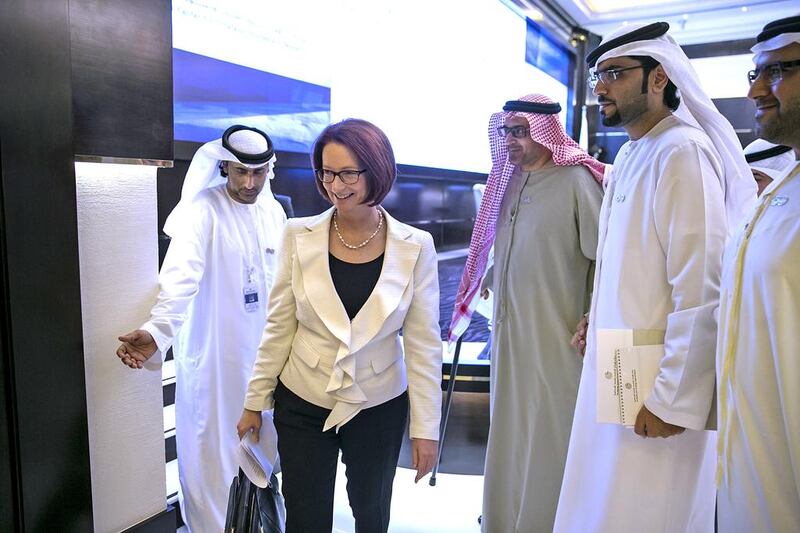ABU DHABI // Australia is working towards a free-trade agreement with the Gulf Cooperation Council, said Australia’s former prime minister Julia Gillard on Monday.
A free-trade agreement between the GCC and Australia could help remove blockages in business transactions and investment, Ms Gillard told an audience at the Emirates Centre for Strategic Studies in Research in Abu Dhabi.
“Trade between our countries exceeds $5 billion annually,” she said. “Free trade is necessary and the completion of a GCC free- trade agreement with Australia is of the highest importance for both our countries.”
Australia’s first female prime minister, who ended her term last June, was giving a lecture on the road map for future cooperation between the UAE and Australia.
“Consistency was at the core of our relationship and a deep friendship of strong ties,” said Ms Gillard. “The leaders of Australia and the UAE deliberately moved towards broader horizons recently and a bilateral relationship plays a dynamic [role] for both countries.”
She said the relationship was strengthened through a commitment to trade and investment and shared strategic interests in the security, stability and development of the Arabian Gulf.
“I acknowledge the courage and commitment your nation has also shown in the fight in Afghanistan,” she said, referring to the UAE’s Al Minhad airbase in Dubai, where the Australian defence force maintains a base.
“Australia is thankful for this host and cooperation, and I am personally thankful because I used the base a number of times to visit our troops.”
Ms Gillard said the friendship between the countries was also expressed in their growing economic relationship.
“We have grown in markets here, in grains, fruits, meat, livestock, dairy, vegetables and also vehicles,” she said. “There are also over 16,000 Australians living in the UAE working in health, education, financial services and construction.”
The UAE is the 11th largest overseas host country for Australians in the world.
“We should see it burst into the top 10,” she said. “A strong economic link will foster and increase the people’s links. Wherever in our world there is trouble in the future, our diplomatic links will be strong enough.”
Ms Gillard said education was a sector in which Australia was looking to expand.
“A significant part of the future is an expansion of the economy in the services sector, especially in education,” she said. “Australia can play a larger role and we can help build the next generation of Emiratis to a more diversified economy at home.”
With about 1,000 Emirati students in Australia’s universities, she said both countries had much to learn from each other.
“How we invest in our people will determine our future,” she said. “I’m delighted there are two outstanding Australian schools in the UAE and two universities teaching 4,000 students.
“But I know with the growing number of young people, providing education for all still poses a challenge.”
Ahmed Al Astad, the centre’s deputy director general for community service, said the relationship between the UAE and Australia had developed into a good model.
And with passenger traffic at Dubai International Airport to and from Australia up more than 38 per cent as a result of the partnership between Emirates airline and Qantas, Ms Gillard said this economic growth could only increase.
“Our nations share a firm friendship,” she said. “In an uncertain and often dangerous world, we’ve come to each other.
“Our nations and peoples want to live in peace and security but we live in a world that requires us to deal with troubling issues, of which the outcome is not clear and threatens the security and prosperity of the entire world.
“Because of the nature of these issues, it is more important than ever that our two countries work together.”
cmalek@thenational.ae






